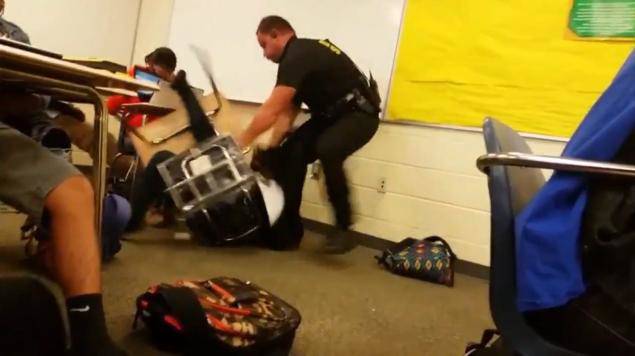
my heart is breaking. watching the video of the child assaulted by a school resource officer in columbia, south carolina is a reminder that our examination of the school-to-prison pipeline can’t miss the forest for the trees. discriminatory systems are upheld by individual actors with racist and sexist beliefs — it’s the teachers, administrators and school resource officers who enforce policies that traumatize and brutalize our kids.
in response to the viral video of the teenager’s assault, law professor kimberlé crenshaw tweeted “black girls have no rights police are bound to respect. are we clear?” yes, professor crenshaw, that message is loud and clear.
5 reasons police have no rights police are bound to respect
- black kids aren’t kids. from tamir rice’s murder by a cleveland police officer to the police assault on a teenage girl in mckinney, texas, police responses to black children and their perceived misbehavior is often disproportionate and severe. unlike their white peers, our children aren’t seen as innocent, but instead as threats who deserve brutal intervention.
- insubordination isn’t tolerated for black girls. this was all prompted by the student refusing to put away a cell phone. a cottdamn cell phone. first, despite the media’s characterization, possessing a cellular device is not nearly as “disruptive” as watching your classmate being drug across the floor by a resource officer. further, in 2015 every teenager in america has a damn cell phone that’s glued to their hands; however, for black girls insubordination is an infraction worthy of assault. second, even if she was standing on a desk singing the entire chorus of future’s “f*ck up some commas,” it’s absolutely unconscionable that anyone not posing a legitimate physical threat would be handled in that manner by an officer of the law.
- there’s a plethora of training on non-violent de-escalation techniques. yet these techniques aren’t required in public schools. the mandt system is just one of many successful techniques used to reduce and eliminate physical restraints by authority figures in group settings. surely something similar could have de-escalated a situation with a student who was sitting quietly in her chair. it’s obvious that the problem isn’t a lack of resources, but that police have no incentive to use a clinical approach when interacting with black girls.
- we can’t advocate for each other. the only student courageous enough to oppose her classmates’ brutalization was also arrested. moments like this teach our children that not only are their lives valueless, but we all must accept this treatment — if not, we’ll face similar consequences. you know that american ethic about standing up for what you believe in? yeah. it doesn’t apply to black girls.
- resource officers are doing jobs that belong to teachers and school administrators. police don’t belong in schools. period. they’re lubricant for the school-to-prison pipeline and aren’t adequately trained in adolescent development, trauma or mental health concerns. without such knowledge, their interaction with children in high stress situations will always lack the proper therapeutic techniques that human beings deserve. as a former teacher, i blame spring valley high’s teachers and administrators for their inability to handle insubordination (which is a natural component of adolescence) without needing to involve police.
there’s no justification for any person being treated like the student in the video; however, for black women, this treatment is part of our lived experience. the misogynoir we face through our housing conditions, economic circumstances, under/unemployment, personal relationships, lack of access to quality healthcare and our interactions with police, among other forms of trauma, is downright violent. a cell phone is now the latest excuse to substantiate our burden.
image : jimmy paradise via twitter

1 Comment